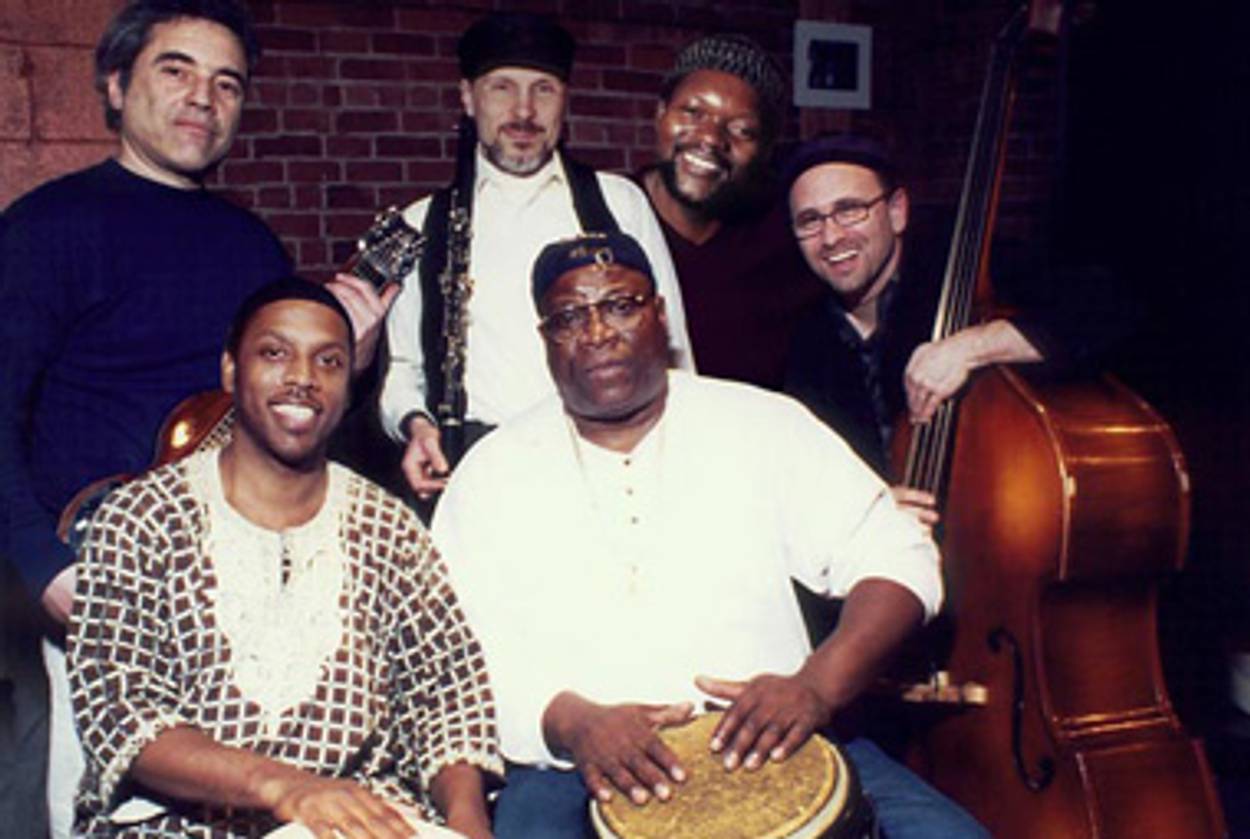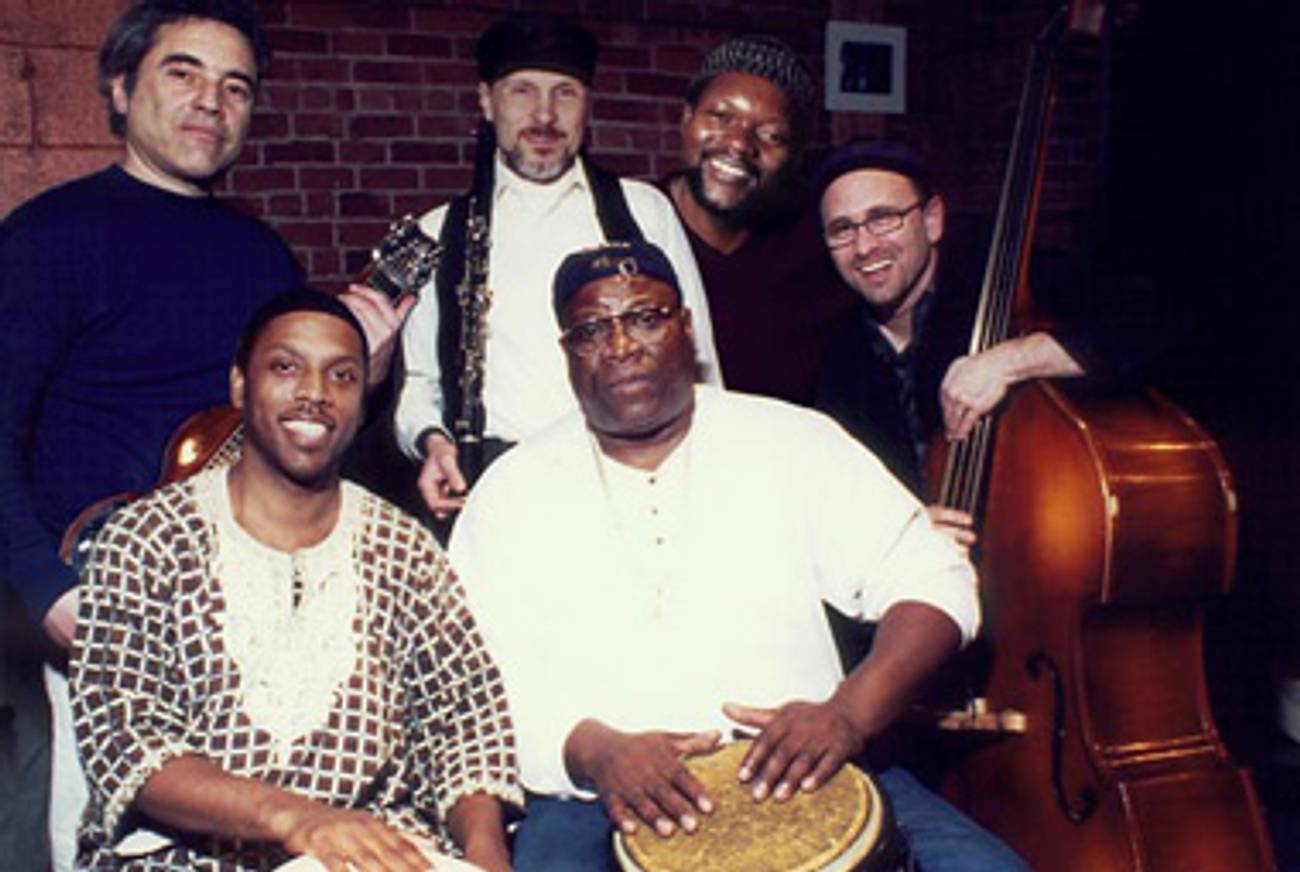Hyphenated Sounds
Two bands cultivate the ‘Afro-Judaic’ aesthetic




There’s a long tradition of Jews embracing others’ musical traditions. Some of these people—including perhaps the most famous example, the Jazz Age clarinetist Mezz Mezzrow (né Milton Mesirow), who fully renounced his Jewish heritage and identified as an African-American instead—were running away from something; namely, Jewish music and Jewish identity. Others, however, were running toward something, embracing other musical traditions without abandoning their own. You can’t always tell which is which just by listening to the results, but sometimes it’s pretty obvious. Trumpeter Roger Ruzow, in Atlanta, and bassist David Chevan, in New Jersey, are both clearly musicians who’ve chosen to broaden their palates rather than simply cleanse them.
Ruzow’s 4th Ward Afro-Klezmer Orchestra, or 4WAKO, is just what the name implies: a band that combines Afropop with Eastern European Jewish music—though there are hints of other styles floating around in there, as well. Ruzow, who was a founding member of the avant-jazz Gold Sparkle Band, once co-led a klezmer ensemble called Mazel Tov Cocktail. Seven or eight years ago, he acquired a taste for the African pop produced by musicians like Fela Kuti, King Sunny Ade, and Thomas Mapfumo, and a year-and-a-half ago, he had the idea to fuse the genres. “It just came to me, and I wrote three tunes,” he said in an interview. He brought together a group of veteran Atlanta players to perform them, and soon he’d written a bunch more, resulting in East Atlanta Passover Stomp, 4WAKO’s debut album, released last November.
The first track, “Greater Lagos Wednesday Night Prayer Meeting”—named for a tune by one of Ruzow’s heroes, the African-American bassist and composer Charles Mingus, who was himself known to work in a wide range of styles—is a traffic-stopping illustration of the group’s Afro-Judaic aesthetic. What begins as a silky-smooth, Fela-style Afrobeat groove, complete with drunken horns, suddenly segues into a jaunty arrangement of Harry Kandel’s klezmer classic, “A Nacht in Gan Eden” (“A Night in the Garden of Eden”). The 10-piece band proceeds to cut back and forth between the two like a DJ dropping the needle on two very different records, and while that might not seem like the best idea in theory, in practice, it’s great—at least, if you like both Fela Kuti and Harry Kandel (and really, why wouldn’t you?)
Something similar occurs on “Sweet Auburn Mishegas,” in which Ruzow alternates between an original, and slightly deranged, klezmer-inspired melody and another laid-back Afro-groove. On other tracks, however, like “Dolgo Horo,” he juxtaposes European- and African-derived sounds vertically rather than horizontally, supporting an Eastern European melody (in this case, a Balkan one) with West African rhythms.
Just as Mingus often imbued his work with a political subtext, so, too, does Ruzow. The band is named for Atlanta’s historically black Old Fourth Ward, which encompassed the once-affluent, then crime-ridden, and now-gentrifying Sweet Auburn district where Martin Luther King Jr. was born. The title “Sweet Auburn Mishegas” sums up Ruzow’s attitude to the way in which the area was redeveloped in the name of creating a “mixed income” neighborhood—a laudable goal, but one that he feels simply provided cover for razing a bunch of older, low-rent buildings and displacing their poor black residents. (He may have a point.) “A Nacht in Gan Eden” also has geopolitical significance. “Some people say that the Garden of Eden was in central Africa,” said Ruzow, who intended the tumultuous collision of klezmer and Afrobeat to represent “the strife and indignities occurring on the African continent.”
Strife is also a theme in David Chevan’s most recent recording, The Road that Heals the Splintered Soul. Since 1998, Chevan and pianist Warren Byrd have led the Afro-Semitic Experience, an ensemble dedicated to exploring the musical heritage of both Jews and blacks. Their repertoire encompasses synagogue and church music, jazz, blues, and material from the African diaspora. The ASE’s latest offering explores some of the more painful episodes in black and Jewish history, with an eye toward healing and forgiveness, and it draws on the group’s distinctively bifurcated pool of resources.
“Shout It from the Mountain” is based on “Run Daniel,” an old slave song from the Georgia Sea Islands with a rhythm that resembles a common klezmer pattern. “I have always been bothered by the lack of the slave voice in the Torah,” Chevan wrote in an email. “We read about Moses, but we don’t really hear the voices of the Hebrew slaves. And we certainly don’t have any of the slave songs that the Jews must have sung while working for Pharaoh. So I began to imagine what a Jewish slave song would have sounded like.” What he imagined includes elements of “Run Daniel,” supplemented by a klezmerish melody and some jazzy improvisation. Similarly, “Adon Olam,” which is sung both at Sabbath services and for the dead, gets a funk-jazz makeover; and the title track includes an impassioned, gospel-tinged vocal, along with instrumental nods to John Coltrane’s spiritually charged “A Love Supreme” and Nat Adderley’s hard-bop classic, “Work Song.”
The Afro-Semitic Experience and 4WAKO both move easily between tight ensemble playing and a looser, more ragged sensibility. The sense that things are sometimes falling apart lends added energy to these groups, ensuring that their explorations of different genres and traditions, though touching upon issues of race and class, never become dryly academic or polemical. Like good music everywhere, their work offers something for the mind, something for the heart—and something for regions further south, as well.
Alexander Gelfand is a recovering ethnomusicologist, a sometime jazz pianist, and a former West African drummer. His work has appeared in the New York Times, the Chicago Tribune, the Forward, and elsewhere.
Alexander Gelfand is a recovering ethnomusicologist, a sometime jazz pianist, and a former West African drummer. His work has appeared in the New York Times, the Chicago Tribune, the Forward, and elsewhere.